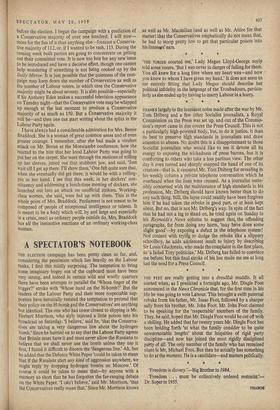THANKS largely to the incessant noise made after the war
by Mr. Tom Driberg and a few other Socialist journalists, a Royal Commission on the Press was set up, and out of the Commis- sion's report came in due course the Press Council. This is not a particularly high-powered body, but, to do it justice, it does its best to preserve high standards in journalism and draw attention to abuses. No doubt this is a disappointment to those Socialist journalists who would like to see it devote all its energy to exposing the wickedness of press barons, but it is comforting to others who take a less partisan view. The other day it even turned and sharply snapped the hand of one of its creators—that is, it censured Mr. Tom Driberg for revealing in his weekly column a private telephone conversation which he overheard when the lines were crossed. As a journalist osten- sibly concerned with the maintenance of high standards in his profession, Mr. Driberg should have known better than to do any such thing. Still, the lapse could readily have been forgiven him if he had taken the rebuke in good part, or at least kept silent. But no, that is not Mr. Driberg's way. In spite of the fact that he had not a leg to stand on, he tried again on Sunday in his Reynolds's News column to suggest that the offending paragraphs, far from doing any harm, `may hhve done some slight good'—by exposing a defect in the telephone system ! Not content with tryirIg to dodge the rebuke like a slippery schoolboy, he adds adolescent insult to injury by describing Sir Louis Gluckstein, who made the complaint in the first place. as `a failed Tory politician.' Mr. Driberg has failed to convince me before, but this final stroke of his has made me see at long last the need for a Press Council.
* * *










































 Previous page
Previous page